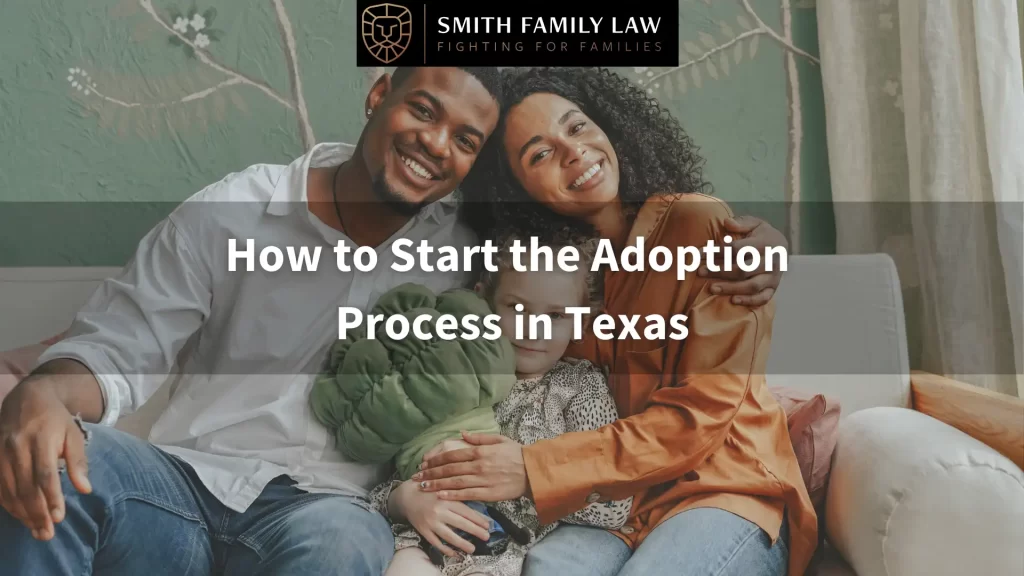Expanding your family through adoption is exciting. Nothing is more fulfilling and rewarding than opening your heart and home to a child. However, navigating the adoption process can also be an overwhelming time for families. Protecting children and finding them suitable and loving homes is the goal of adoption. At the same time, it comes with a complicated labyrinth of rules, regulations, and steps that can lead to frustration and tears. How do you adopt a child in Texas? Let our legal team guide you through how to start the adoption process in Texas.
Starting the Adoption Process in Texas
Step one in the adoption process is opening your heart and home to a child. Once you settle on adoption as the best path for your family, it is time to begin the adoption process in Texas officially. Adoption is the legal process where a child joins a new family, different from the child’s birth parents. It is a permanent and lifelong commitment.
First, those looking to add to their families via adoption must ensure they can legally adopt a child in Texas. The state outlines specific criteria individuals must meet to adopt a child legally. Prospective parents can be either single or married, but they must meet these Texas adoption requirements:
- Must be 21 years of age
- Must be financially stable and mature
- Must share information regarding their background and lifestyle
- Provide relative and non-relative references
- Show proof of marriage or divorce when necessary
- Agree to participate in home study
- Submit a complete criminal history background check
- Attend training to learn about issues abused and neglected children face
Adoption Types in Texas
If you and your family meet the Texas adoption requirements, your next step is selecting the type of adoption you want to seek. There are several ways you can add a child to your life, including:
- Domestic adoption
- International adoption
- Foster care to adoption
- Private adoption
Once you narrow down which type of adoption you want, you may seek an adoption professional for help. There are numerous adoption agencies in Texas. When choosing to work with an adoption agency, do your homework. Always look for an agency that is licensed for adoption in the state of Texas and has a good reputation. Ask questions about cost, fees, wait times, support, education programs available, and staff training. Agencies should be trustworthy and transparent.
Typically, the next step in the adoption process involves completing the state’s adoption home study and educational and training requirements. When you have completed all the necessary steps, the wait begins. When a match is found, you can move toward legally finalizing the adoption by working with your attorney to complete the remaining paperwork, schedule post-placement visits, and attend a finalization hearing.
Adoption Agencies in Texas
Choosing an adoption agency to work with comes down to personal preference. You want to focus on choosing an agency with experience handling the adoption type you want to pursue. Some agencies specialize in the unique challenges of international adoptions, while others focus on local adoptions.
Always do your research before selecting an adoption agency. Read reviews, talk to other parents, and ask questions. You must work with a reputable agency you trust. Communication should be open and transparent so you always feel safe about where you are in the adoption process.
You may want to consider researching these Texas adoption agencies:
- American Adoptions of Texas
- Access Hope
- Gladney Center for Adoption
- The Safe Alliance
- Adoption Choices of Texas
- The Settlement Home for Children
- Texas Department of Family and Protective Services
- Texas Foster Care and Adoption Services
- TBHC Foster Care & Adoption
- Hope International
Discuss your needs with several adoption agencies and choose the one that best addresses your needs and goals.
Texas Adoption Laws
In addition to the legal requirements established by the state for adopting a child, Texas law also outlines who can legally adopt a child. A child can be adopted in Texas when each living parent has their parental rights terminated voluntarily or involuntarily. However, stepparents are allowed to pursue the adoption of a child without terminating the legal rights of both biological parents. The biological parent married to the stepparent can retain their rights if the other biological parent terminates their parental rights, making room for the stepparent to adopt the child legally.
Children 12 years and older must also consent to adoption according to state law. Consent must be in writing or offered in court. Advertising adoptions is also strictly prohibited, meaning adoptive parents and birth parents cannot advertise that they are seeking adoption opportunities. Only adoption agencies and professionals can advertise in Texas for prospective parents and adoptive families.
Finally, Texas does not allow prospective mothers to accept payment in exchange for the placement of their child. Adoptive parents may elect to assist a mother with prenatal care expenses and the costs related to pregnancy and childbirth. However, they cannot offer payments or gifts to incentivize placement.
Home Study Process in Texas

After the interview portion, the home study social worker asks to tour your home with you. Your house does not have to be perfect. Social workers only look for apparent hazards, safety concerns, and potentially unsanitary living conditions. If you have stairs in your home or chemicals in floor-level cabinets, you don’t necessarily need to childproof these areas yet but confirm with the social worker the measures you intend to take to protect a child when the time comes.
After your child comes to live with you, expect post-placement visits. The home study social worker conducts a final round of in-home visits to ensure you and your family are well-adjusted.
Seek Help from a Knowledgeable Texas Adoption Attorney
Do you want to expand your family through adoption? Adoption allows you to share your love and compassion with a child, providing them with a stable and caring environment where they can grow and thrive. At Smith & Bledsoe Family Law, we can help you start and navigate the sometimes-challenging Texas adoption process.
Protect your family and prepare for what’s ahead with the help of a sensitive Texas adoption attorney. Call our office today at (512) 277-3166 or contact us online for a confidential consultation.
Related Reading:
